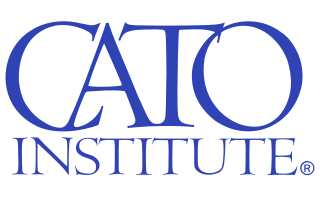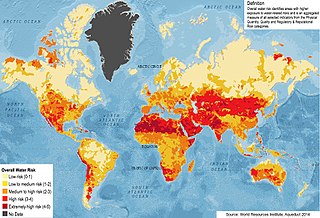A think tank, or policy institute, is a research institute that performs research and advocacy concerning topics such as social policy, political strategy, economics, military, technology, and culture. Most think tanks are non-governmental organizations, but some are semi-autonomous agencies within government or are associated with particular political parties, businesses or the military. Think-tank funding often includes a combination of donations from wealthy individuals and personal contributions, with many also accepting government grants.

Security is protection from, or resilience against, potential harm caused by others, by restraining the freedom of others to act. Beneficiaries of security may be of persons and social groups, objects and institutions, ecosystems or any other entity or phenomenon vulnerable to unwanted change.
The National Security Strategy (NSS) is a document prepared periodically by the executive branch of the United States that lists the national security concerns and how the administration plans to deal with them. The legal foundation for the document is spelled out in the Goldwater–Nichols Act. The document is purposely general in content, and its implementation relies on elaborating guidance provided in supporting documents such as the National Military Strategy.

The Cato Institute is an American libertarian think tank headquartered in Washington, D.C. It was founded in 1977 by Ed Crane, Murray Rothbard, and Charles Koch, chairman of the board and chief executive officer of Koch Industries. Cato was established to have a focus on public advocacy, media exposure and societal influence. According to the 2017 Global Go To Think Tank Index Report, Cato is number 15 in the "Top Think Tanks Worldwide" and number 10 in the "Top Think Tanks in the United States".

Food security is the measure of the availability of food and individuals' ability to access it. According to the United Nations' Committee on World Food Security, food security is defined as meaning that all people, at all times, have physical, social, and economic access to sufficient, safe, and nutritious food that meets their food preferences and dietary needs for an active and healthy life. The availability of food irrespective of class, gender or region is another one. There is evidence of food security being a concern many thousands of years ago, with central authorities in ancient China and ancient Egypt being known to release food from storage in times of famine. At the 1974 World Food Conference, the term "food security" was defined with an emphasis on supply; food security is defined as the "availability at all times of adequate, nourishing, diverse, balanced and moderate world food supplies of basic foodstuffs to sustain a steady expansion of food consumption and to offset fluctuations in production and prices". Later definitions added demand and access issues to the definition. The first World Food Summit, held in 1996, stated that food security "exists when all people, at all times, have physical and economic access to sufficient, safe and nutritious food to meet their dietary needs and food preferences for an active and healthy life."

National security, or national defence, is the security and defence of a sovereign state, including its citizens, economy, and institutions, which is regarded as a duty of government. Originally conceived as protection against military attack, national security is widely understood to include also non-military dimensions, including the security from terrorism, minimization of crime, economic security, energy security, environmental security, food security, and cyber-security. Similarly, national security risks include, in addition to the actions of other nation states, action by violent non-state actors, by narcotic cartels, and by multinational corporations, and also the effects of natural disasters.

The Brookings Institution, often simply called Brookings, is an American research group founded in 1916. Located on Think Tank Row in Washington, D.C., the organization conducts research and education in the social sciences, primarily in economics, metropolitan policy, governance, foreign policy, global economy, and economic development. Its stated mission is to "provide innovative and practical recommendations that advance three broad goals: strengthen American democracy; foster the economic and social welfare, security and opportunity of all Americans; and secure a more open, safe, prosperous, and cooperative international system."

The Hudson Institute is a conservative American think tank based in Washington, D.C. It was founded in 1961 in Croton-on-Hudson, New York, by futurist, military strategist, and systems theorist Herman Kahn and his colleagues at the RAND Corporation.
The Atlantic Council is an American think tank in the field of international affairs, favoring Atlanticism, founded in 1961. It manages ten regional centers and functional programs related to international security and global economic prosperity. It is headquartered in Washington, D.C. It is a member of the Atlantic Treaty Association.

The Center for Strategic and International Studies (CSIS) is a think tank based in Washington, D.C., in the United States. CSIS was founded as the Center for Strategic and International Studies of Georgetown University in 1962. The center conducts policy studies and strategic analyses of political, economic and security issues throughout the world, with a specific focus on issues concerning international relations, trade, technology, finance, energy and geostrategy.

The Competitive Enterprise Institute (CEI) is a non-profit libertarian think tank founded by the political writer Fred L. Smith Jr. on March 9, 1984, in Washington, D.C., to advance principles of limited government, free enterprise, and individual liberty. CEI focuses on a number of regulatory policy issues, including business and finance, labor, technology and telecommunications, transportation, food and drug regulation, and energy and environment in which they have promoted climate change denial. Kent Lassman is the current President and CEO.
ThinkProgress was an American progressive news website that was active from 2005 to 2019. It was a project of the Center for American Progress Action Fund, a progressive public policy research and advocacy organization. Founded by Judd Legum in 2005, the site's reports were regularly discussed by mainstream news outlets and peer-reviewed academic journals. ThinkProgress also hosted a climate section called Climate Progress, which was founded by Joe Romm.
The Stimson Center, named after American statesman, lawyer, and politician Henry L. Stimson, is a nonprofit, nonpartisan think tank which aims to enhance international peace and security through a combination of analysis and outreach. The Center's stated approach is pragmatic – seeking to provide policy alternatives, solve problems, and overcome obstacles towards a more peaceful and secure world.

The Center for a New American Security (CNAS) is a Washington, D.C.-based think tank established in 2007 by co-founders Michèle Flournoy and Kurt M. Campbell. It specializes in the United States' national security issues. CNAS focuses on terrorism and irregular warfare, the future of the U.S. military, the emergence of Asia as a global power center, and the national security implications of natural resource consumption. Former Deputy Secretary of State James Steinberg called CNAS "an indispensable feature on the Washington landscape."

The Center for Global Development (CGD) is a nonprofit think tank based in Washington, D.C., and London that focuses on international development.
The Center for the National Interest is a Washington, D.C.-based public policy think tank. It was established by former U.S. President Richard Nixon on January 20, 1994, as the Nixon Center for Peace and Freedom.

Water security has been defined as "the reliable availability of an acceptable quantity and quality of water for health, livelihoods and production, coupled with an acceptable level of water-related risks". It is realized to the degree that water scarcity is non-existent, or has been decreased or eliminated, and to the degree that floods and contamination of freshwater supplies are non-threatening. Water security is considered to be a necessity of sustainable development for its importance in the quality of life of the people in a region. Water security is therefore also linked to social justice and equitable distribution of environmental benefits and harms Sustainable development would result in lowered poverty and increased living standards for those most susceptible to the impacts of insecure water resources in the region, especially women and children.

The World Resources Institute (WRI) is a global research non-profit organization established in 1982 with funding from the MacArthur Foundation under the leadership of James Gustave Speth. WRI's activities are focused on seven areas: food, forests, water, energy, cities, climate and ocean.

Climate security refers to the security risks induced, directly or indirectly, by changes in climate patterns. It is a concept that summons the idea that climate-related change amplifies existing risks in society that endangers the security of humans, ecosystems, economy, infrastructure and societies. Climate-related security risks have far-reaching implications for the way the world manages peace and security. Climate actions to adapt and mitigate impacts can also have a negative effect on human security if mishandled.

The term Nature-based solutions (NBS) refers to the sustainable management and use of natural features and processes to tackle socio-environmental challenges. These challenges include issues such as climate change, water security, water pollution, food security, human health, biodiversity loss, and disaster risk management.













